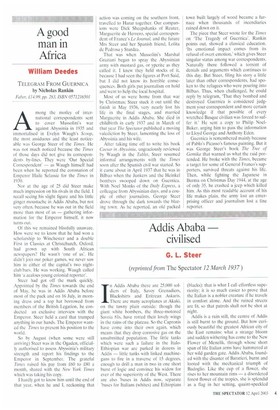A good man in Africa
William Deedes
TELEGRAM FROM GUERNICA by Nicholas Rankin
Faber, £14.99. pp. 283, ISBN 0571216501
Among the motley of international correspondents sent to cover Mussolini's war against Abyssinia in 1935 and immortalised in Evelyn Waugh's Scoop, the most assiduous and the least noticeable was George Steer of the Times. He was not much noticed because the Times of those days did not give its correspondents by-lines. They were 'Our Special
Correspondent' as Waugh himself had been when he reported the coronation of Emperor Haile Selassie for the Times in 1930.
Nor at the age of 25 did Steer make much impression on his rivals in the field. I recall seeing his slight figure and his little ginger moustache in Addis Ababa, but not very often, because he was out in the field more than most of us — gathering information for the Emperor himself, it now turns Out.
Of this we remained blissfully unaware. How were we to know that he had won a scholarship to Winchester and a double First in Classics at Christchurch, Oxford, had grown up with South African newspapers? He wasn't 'one of us'. He didn't join our poker games, we never saw him in either of the capital's two nightclub/bars. He was working. Waugh called him 'a zealous young colonial reporter'.
Steer had got off the mark quickly. Appointed by the Times towards the end of May, he was in Addis Ababa before most of the pack and on 16 July, in morning dress and a top hat borrowed from members of the British Legation, he conducted an exclusive interview with the Emperor. Steer held a card that trumped anything in our hands. The Emperor wanted the Times to present his position to the world.
So by August (when some were still arriving) Steer was in the Ogaden, officially authorised to assess Abyssinia's military strength and report his findings to the Emperor in September. The grateful Times raised his pay from £60 to £80 a month, shared with the New York Times which was taking his copy.
I hardly got to know him until the end of that year, when he and I, reckoning that action was coming on the southern front, travelled to Harar together. Our companions were Dick Sheepshanks of Reuter, Marguerite de Herrero, special correspondent of France's Le Journal, and the future Mrs Steer and her Spanish friend, Lolita de Pedrosa y Sturdza.
That was when Mussolini's Marshal Graziani began to spray the Abyssinian army with mustard gas, or yperite as they called it. I knew they held stocks of it, because I had seen the figures at Port Said, but I did not know its horrible consequences. Both girls put journalism on hold and went to help the local hospital.
Most of us were home from that war by Christmas; Steer stuck it out until the finish in May 1936, very nearly lost his life in the final stages, and married Marguerite in Addis Ababa. She died in childbirth in early 1937 and in March of that year The Spectator published a moving valediction by Steer, lamenting the loss of Abyssinia and his wife.
After taking time off to write his book Caesar in Abyssinia, ungraciously reviewed by Waugh in the Tablet, Steer resumed informal arrangements with the Times soon after the Spanish civil war started. So it came about in April 1937 that he was in Bilbao when the Junkers and the Heinkel bombers swooped down on Guernica. With Noel Monks of the Daily Express, a colleague from Abyssinian days, and a couple of other journalists, George Steer drove through the dark towards the blazing town. As he reported. an oIci packed
town built largely of wood became a furnace when thousands of incendiaries rained down on it.
The piece that Steer wrote for the Times on 'The Tragedy of Guernica', Rankin points out, showed a classical education. 'Its emotional impact comes from its refusal of overt emotion.' which gives Steer singular status among war correspondents. Naturally there followed a torrent of denials and arguments which continues to this day. But Steer, filing his story a little later than other correspondents, had spoken to the refugees who were pouring into Bilbao. Thus, when challenged, he could reply by telegram, 'That they bombed and destroyed Guernica is considered judgment your correspondent and more certain knowledge if that possible of every wretched Basque civilian was forced to suffer it.' He sent a copy to Philip NoelBaker, urging him to pass the information to Lloyd George and Anthony Eden.
Guernica is remembered mainly because of Pablo's Picasso's famous painting. But it was George Steer's book The Tree of Gernika that warned us what the raid portended. He broke with the Times, became a target for some of General Franco's supporters, survived threats against his life. Then, while fighting the Japanese in Burma on Christmas Day 1944, at the age of only 35, he crashed a jeep which killed him. As this most readable account of his life makes plain, the army lost an enterprising officer and journalism lost a fine reporter.


































































 Previous page
Previous page